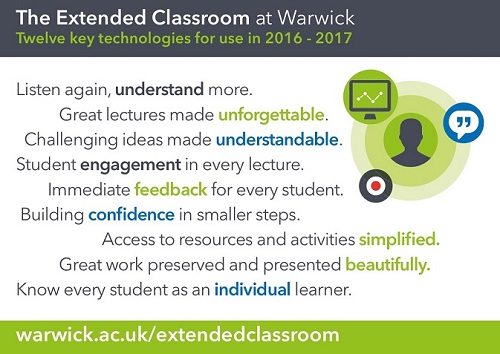Academic Systems
Strong disciplinary identities and excellence will be strengthened by reform of core processes and continued investment in digital innovations and evolving facilities for teaching and learning
Our goals:
Academic Governance
Virtual Learning Environment (VLE)
Timetable Improvement Programme (TIP)
Academic Governance
We will …
Implement the Academic Governance Review to enable effective, collaborative, and agile decision-making on teaching and learning
We will achieve this by …
- Fully implementing our new Academic Governance structures and undertaking a review of their implementation and effective operation
- Developing the Education Executive to plan and co-ordinate Education Strategy, agree operational priorities, co-ordinate Education activity, report on progress of Education initiatives, and prioritise team resources in support of Education projects
- Ensuring Departmental Education Committees are established to support Education Strategy implementation
- Developing Faculty Education Committees to assist in driving Education Strategy within Faculties and across all levels of study
- Establishing a Student Success Programme Board to enable professional services departments to support the operationalisation of the Education Strategy
- Developing a diverse and representative pipeline of committee chairs, members and secretaries to secure expertise in the longer term
- Enhancing reporting of Education Strategy developments to the University Council
- Reviewing University Regulations to address issues of clarity and accessibility
 |
Case study: Academic Governance ReviewIn 2016, the Senate was invited to consider a paper noting that, partly as a consequence of the changing nature of the external education policy landscape and partly as a result of a need for re-organisation of structures, the time was ripe for a review of academic governing instruments. A working group was established to look at a variety of issues identified and a series of recommendations brought forward for approval 12 months later. |
Virtual Learning Environment (VLE)
We will …
Continue to develop and embed Moodle as the University’s common VLE platform, supported by Tabula and other aspects of the Extended Classroom suite
We will achieve this by …
- Developing and actively supporting good practice in the use of Moodle for modules, programmes, and departments
- Increasing the effective use of Lecture Capture in academic departments
 |
Case study: Virtual Learning Environment (VLE)Students and staff have access to quality tools to support blended and online learning, including access to Lecture Capture, Reading Lists and other key content. The virtual learning environment is continually improved, in line with the needs of the University as defined by the Education Strategy. Building on the growing expertise within departments and services, we continue to develop our provision and support to enhance the student experience. |
Timetable Improvement Programme (TIP)
We will …
Construct an efficient and effective central timetable to facilitate teaching excellence and the student and staff experience
We will achieve this by …
- Delivering personalised timetables for students and staff, containing lectures, practicals and group activity, and accessible via the internet and on a PC, phone or tablet
- Allocating rooms across the normal teaching week based on agreed priorities and principles so that students and staff have an efficient, equitable, user-friendly timetable
- Incorporating returning student module choices into the construction of the timetable to minimise clashes
- Implementing a new Module Selection system
 |
Case study: Personalised Student and Staff TimetablesThe Timetable Improvement Programme, chaired by the Pro-Vice Chancellor for Education and supported the Central Timetabling Team and IT Services, is enhancing the student timetable experience. |
